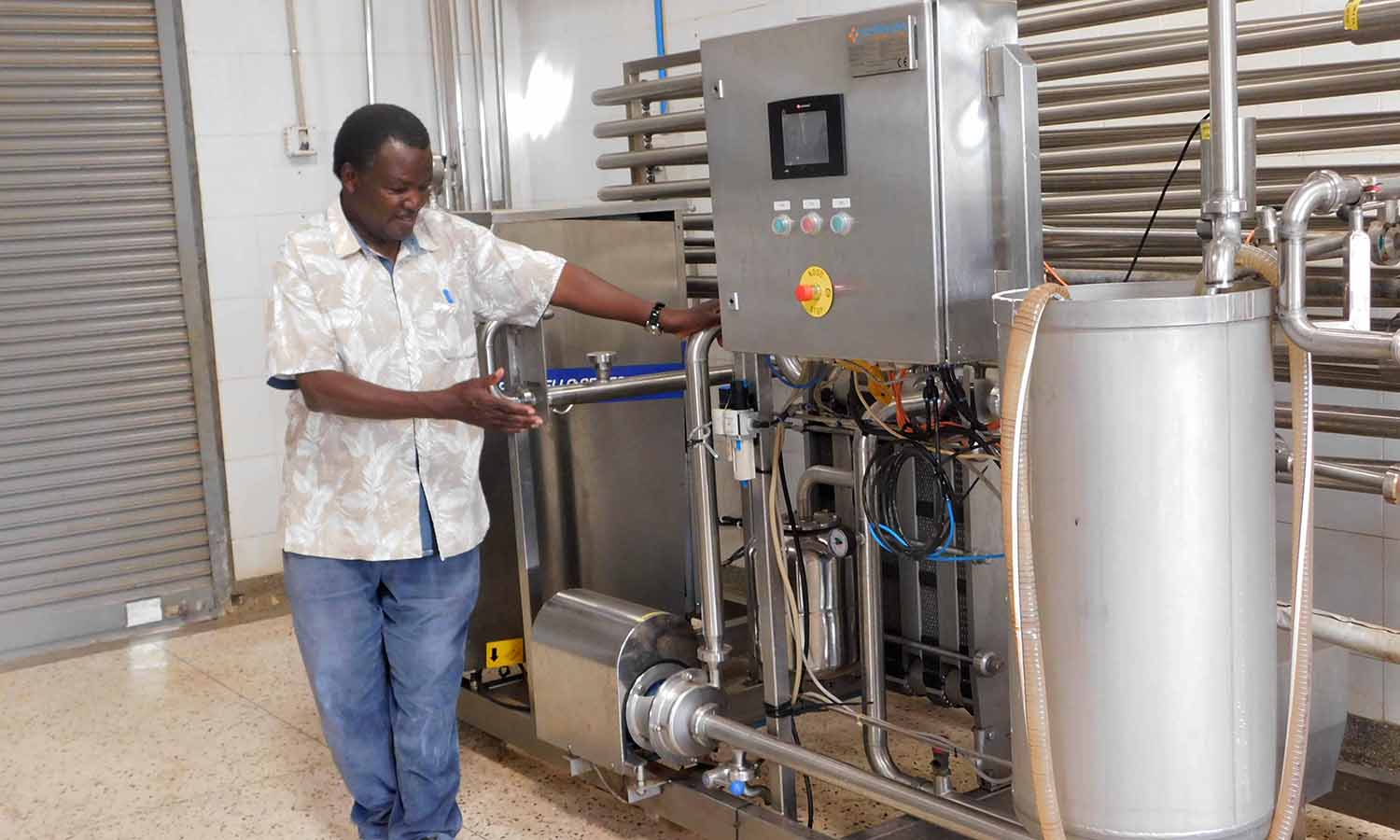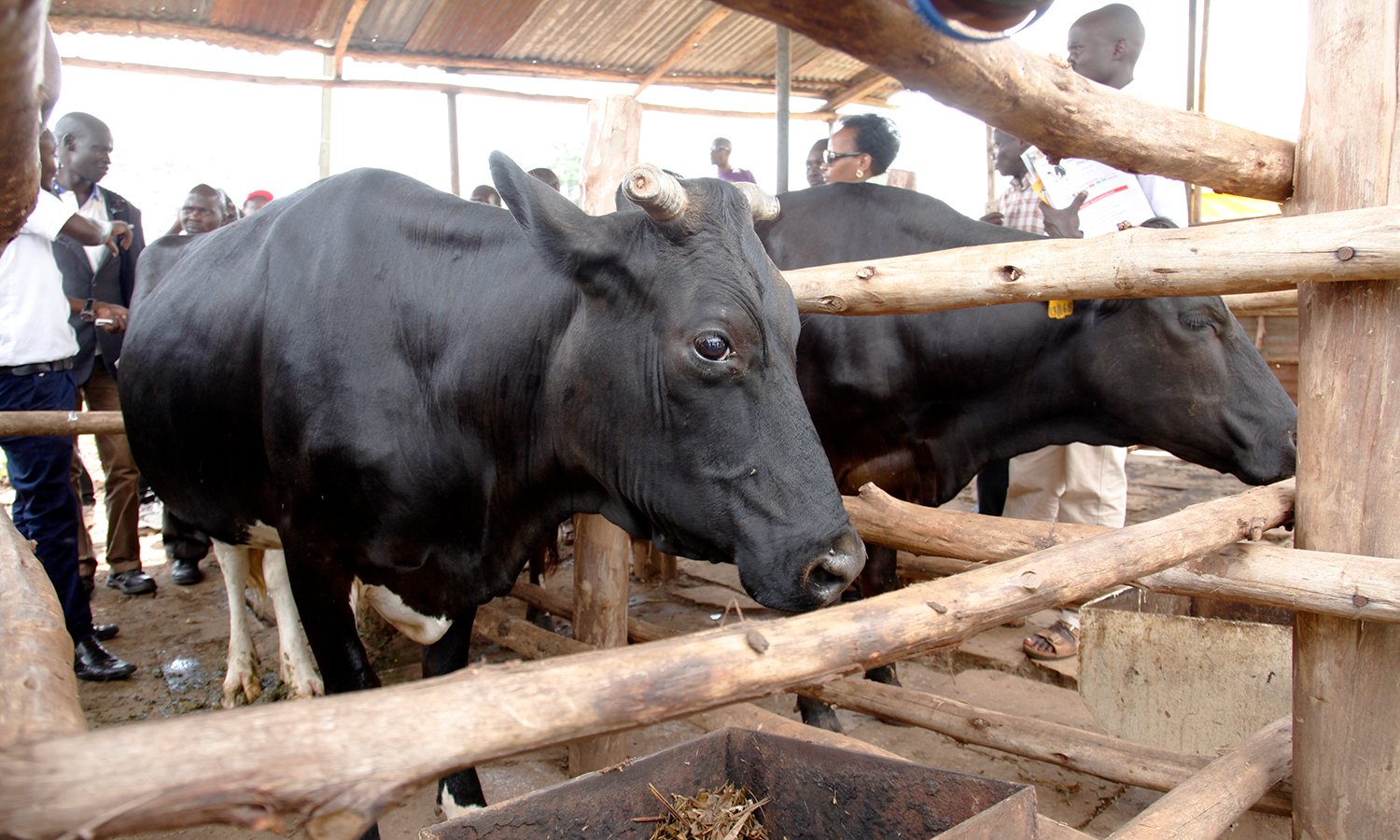Prime
Value addition is the focus of Maddo cattle living loan

Fr Peter Ssenkaayi examines one of the machines inside Maddo Dairies.
What you need to know:
- Fr Ssenkaayi was in the leadership of the agriculture department of Maddo before the formation of dairy plant in 2018. He used to oversee the distribution of Frisian cows among farmers which began in 1993 with just three heifers as he recalls.
Reverend Fr Peter Ssenkaayi, managing director of Maddo Dairies, sits in his office in the young company’s new factory located not far from Kitovu Cathedral in Masaka City, and recalls the simple beginning of Masaka Diocesan Development Organisation (Maddo) more than 30 years ago.
Maddo Dairies which is now a private company limited under Masaka Diocese could be described as an offshoot of Maddo which comprises several different departments including education, health, agriculture, water, information, among others.
How it started
Maddo Dairies today owns a modern factory offering direct employment to nearly thirty people and producing yoghurt, packed milk, and other milk products which it distributes widely in shops, schools, and other institutions across the Masaka region and beyond.
Fr Ssenkaayi was in the leadership of the agriculture department of Maddo before the formation of dairy plant in 2018. He used to oversee the distribution of Frisian cows among farmers which began in 1993 with just three heifers as he recalls.
“One of our major objectives in Maddo was to uplift the living standards of the people through farming,” he says. “Most of them are smallholder farmers and we sought to increase their income by supporting them to sustain the soil fertility in their gardens. We expected good healthy soil to lead to increased crop production, better nutrition, food security, improved health, and higher incomes. So we began with the Frisian cow living loan project.”
Training farmers
Maddo, which had trained agriculturists, undertook to train the Frisian cow living loan recipients how to look after a cow under Zero-grazing. The recipients were particularly taught which grasses to plant for the cow to feed on and to ensure they had enough space on which to grow the grass.
They were also taught how to use farmyard manure to enrich the soil in their gardens. The cow shades had to be constructed in such a way that it was easy to pick the cow dung and to trap urine.
Decayed organic remains are said to contain big amounts of soil nutrients that are vital for plant growth. Each homestead was encouraged to have a vegetable garden and to plant fruit trees. Maddo supports agro-forestry and organic farming which are emphasised in all the farmers training sessions.
Loans
The Frisian cows loaned out to the farmers were pregnant and when a household was given a Frisian cow to keep it was on the understanding that upon the cow bringing forth a calf it would be paid back to Maddo for passing on to another farmer. Father Ssenkaayi says, “We don’t actually refer to this as paying back the loan; rather we say that the farmer has become a donor, by donating the calf to Maddo.”
He went on to tell Seeds of Gold that all farmers were taught the importance of book keeping and gender equity in farming. They were encouraged to save money and to form farmers’ groups. Maddo also put emphasis on meticulous cleanliness and hygiene in all farming households. They all had to make drying racks for their cooking utensils and cutlery. They were taught about garbage collection --- separate rubbish heaps for biodegradable and non-degradable items.
“Most of the farmers were shocked by the amount of milk the cows produced,” Fr Ssenkaayi said. “They had some milk to drink and some extra to sell. Another advantage for keeping cattle was that many of the farmers began using biogas for cooking and lighting ---clean energy. They would then use the slurry as manure in their gardens.”
Maddo undertook to buy the milk from the farmers in 2003 and to turn it into Pasteurized Chocolate Flavoured Milk at a function presided over by then Minister of Finance, Gerald Sendaula on August 8, 2003 when Maddo also began making yogurt.

Benefits
Over time most of the farmers who benefitted from the Friesian cow living loan project began realising the expected benefits, such as improved nutrition and higher incomes which enabled them to take their children to better schools. “We came to realise, just as they did, that in most of our schools the diet mostly consists of just beans and posho,” says Fr Ssenkaayi. “The school children only have plant protein and no animal protein at all. Yet in their homes many of them were used to drinking milk. That is how we came up with the idea of the School Milk Programme which was launched on February 9, 2024.”
Market
Maddo Dairies today supplies milk to some fifteen schools and more schools are encouraged to come on board. Vigorous sensitization is going on among various school managers in the region about the advantages of including milk in the school children’s diet. Fr Ssenkaayi says the idea has been welcomed by many schools and Maddo Dairies is preparing to be supplying milk to some fifty schools soon. “As more schools begin drinking milk we are set to provide more milk,” he says.
Maddo Dairies currently produces about 9,000 litres of milk per week, but with the recently acquired machinery production is bound to become much bigger in the near future. The milk is also sold in shops in small packets at Shs1,000 a packet and bigger ones at Shs2,000.

Father Ssenkaayi (middle) during a visit to one of the farmers that received a cow. Photo/Michael J Ssali
Heifers to farmers
Maddo has so far given out 2483 heifers to farmers. “Once the farmer donates a calf to us he or she keeps the mother animal which continues to produce more cows,” Father Ssenkaayi says. “Our job is mainly to monitor if the recipient continues to keep cows and to make the progress that we expected.” He is not worried that the company will run short of milk suppliers. He says many more people in the region are cattle keepers and milk production is increasing and not declining.
Among some of Maddo Dairies present activities is to make periodic farmers seminars in their respective communities and discussing what they are doing to feed their cows better and to protect them from disease. They also share ideas about their different challenges. “This is an effort for us to ensure that the farmers increase their milk production and incomes. We might even partner with farmers cooperatives in Sembabule District as our alternative milk suppliers.”
Hydroelectricity power outages are a common nuisance that the company must learn to live with. “It sometimes goes off when we have just made all the preparations! Of course we have a strong generator as an alternative but it consumes fuel which increases our overhead expenditures. Due to the frequent power outages we often get tempted to raise the prices of our products but we have to remember that we are not the only producers of packed milk in the country.”
Maddo is a Catholic faith founded organisation but in all its operations it welcomes and includes people of all faiths. “Poverty does not differentiate religions and tribes,” Father Ssenkaayi says. “It is of no use a Catholic getting rich when his Muslim neighbour is languishing in poverty. Our programme targets all people regardless of their faith.”




